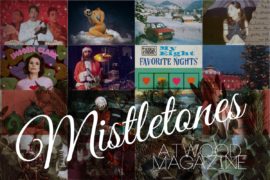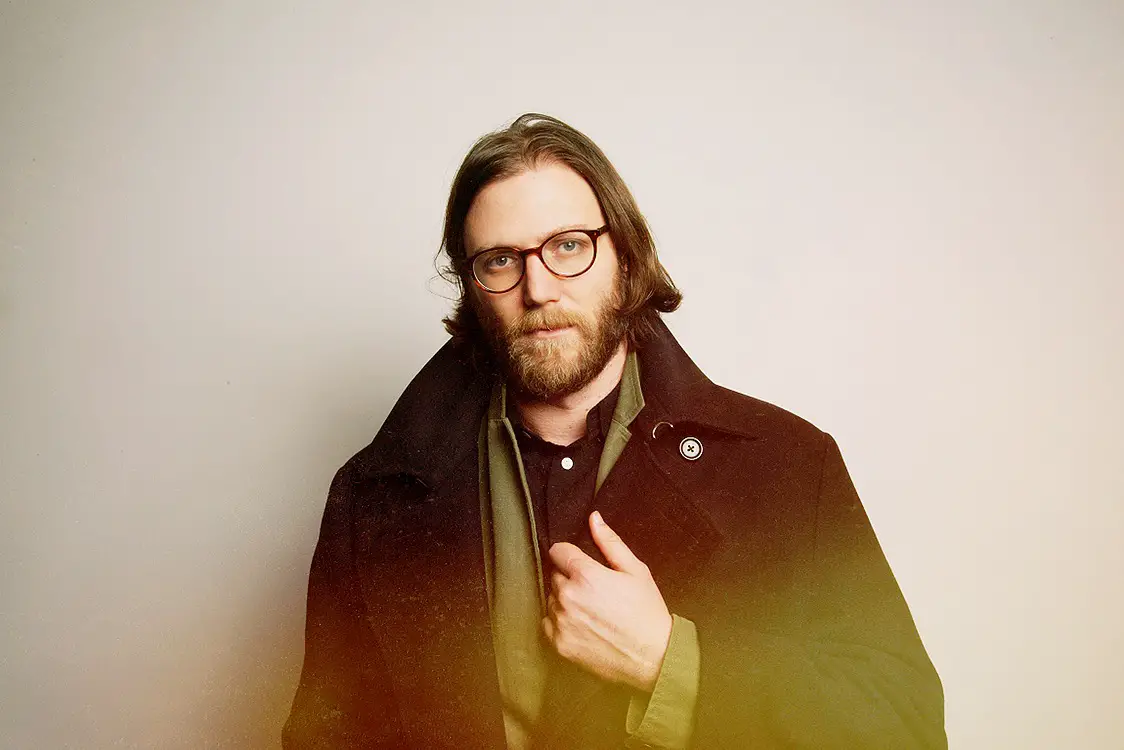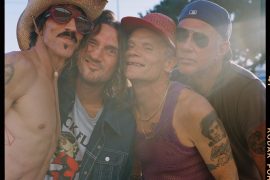Breathing heart-on-sleeve romance back into the world, modern-day crooner Stephen Sanchez dives into his debut album ‘Angel Face’ in an intimate conversation about music, hope, and the eternity of love.
Stream: ‘Angel Face’ – Stephen Sanchez
There’s not enough music that helps people to feel… That’s what I hope for with my music; I hope people get caught in a feeling long enough to chase it, and for that feeling to turn into love.
Truth be told, hopeless romance never went out of style.
Not for Stephen Sanchez, anyway.
A young heart with an old soul, Stephen Sanchez needs little introduction.
With over 1.5 billion streams for his song “Until I Found You” alone, the Platinum-certified singer/songwriter has become one of the most recognizable voices in music practically overnight, seducing audiences around the world with a musical style that feels at once timeless and classic: Inspired by the Motown sound, early R&B/soul pioneers like The Platters, Marvin Gaye, and Sam Cook, old-school rock n’ rollers like Roy Orbison and Elvis, Spaghetti Western films, and more, Sanchez is single-handedly redefining the 2020s American songbook, building upon decades-old traditions long thought to be things of the past.
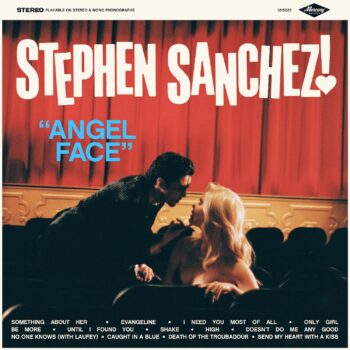
Georgia, wrap me up in all your
I want you in my arms
Oh, let me hold you
I’ll never let you go again like I did
Oh, I used to say
I would never fall in love again until I found her
I said, “I would never fall unless it’s you I fall into”
I was lost within the darkness, but then I found her
I found you
– “Until I Found You,” Stephen Sanchez
Perhaps the best lesson here is, never say never. The music of the late ‘50s and early ‘60s has found its revival in a doe-eyed Californian who wears his heart on his sleeve, living out his dreams whilst bringing his own brand of blue-eyed soul, and a cinematic rockabilly-meets-Western-troubadour aesthetic, to the masses.
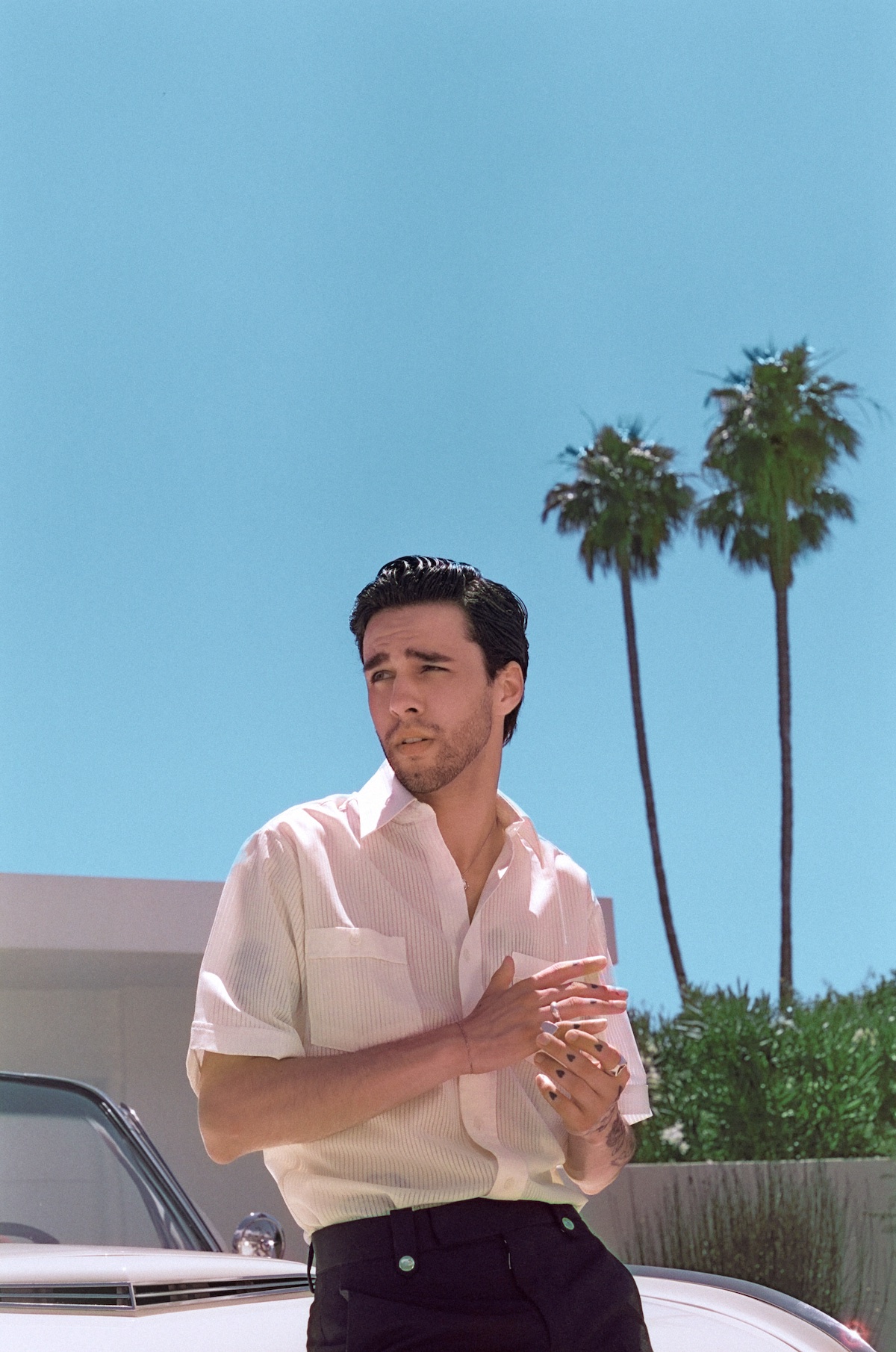
With his debut album Angel Face, Stephen Sanchez emerges as a modern day crooner breathing hope, love, charm, and romance into the world.
An Atwood Magazine Editor’s Pick and one of our 2023 Artists to Watch, the 21-year-old has proved his vocal and songwriting talents ten times over. Released September 22, 2023 via Mercury Records / Republic Records, Angel Face is a record “all about love’s humanity.” It’s a record that aims to show both what love should look like, and what love actually is.
Thirteen songs produced by Grammy Award winner Ian Fitchuk and Konrad Snyder (as well as Lord Huron’s Ben Schneider) tell the fictional story of famed crooner Troubadour Sanchez who falls in love with Evangeline, the girlfriend of a mob boss named Hunter, who owns an LA nightclub called The Angel. The Troubadour gives Evangeline the nickname “Angel Face” (hence the name of the album), and together, the two star-crossed lovers kindle an ill-fated secret romance that ends in death and tragedy – a lesson, ultimately, in love’s immortality.
That kind of intimate connection is Sanchez’s North Star; he is inspired, enthralled, and deeply moved by the power of love.
“I think there’s the beauty of that, in the reality of love, we get to be with someone, God willing, for 60 years, right? But anything has the power in life to take that person away physically,” he says. “But emotionally they remain, they linger on, thank God for emotions for that. Right? Physically you won’t be able to see them. You won’t be able to hear them, but being able to know what they feel like, that your mind has been so wrapped up in a person that you remember them… I just love that stuff so much.”
Baby, give it all
I’d give it all just to make you mine
And if you need a minute
Honey, I’ll give you all my time, all the time
Do you need The Sandman
Or a phone call to Mr. Jones?
Oh, I’ll put your dreams to sleep
With rattling bones
So don’t go to sleep, don’t rest your head
I’ll be the pillow and I’ll be the bed
Holding your dreams as you lie to rest
Evangeline, Evangeline
– “Evangeline,” Stephen Sanchez
That he is at the end of the day a hopeless romantic is Sanchez’s not-so-secret weapon.
That kind of dreamy idealism, mixed with moments of anguish and heartache depending on the circumstance, is one (of the many) keys to his meteoric rise and his music’s overnight success.
Just like Sanchez and the characters in his songs, we’re all living in search of love, looking to give love and to be loved in return. The songs on Angel Face pay homage to that universal higher power; they’re ballads and anthems, odes and upheavals all centered around love’s beauty, love’s brutality, love transience, and love’s eternity. From smash hits like “Until I Found You” and “Evangeline” to deeper cuts like “No One Knows” (a duet with Laufey), “Caught in a Blue,” and album opener “Something About Her” (which Sanchez considers the first real love song he’s ever written), Angel Face promises to warm not just your ears, but your heart and soul as well.
Enchanted as ever, Atwood Magazine sat down with Stephen Sanchez for an intimate conversation about music and love. Dive into the depths of Angel Face – a true masterpiece of a debut, if ever there was one – in our interview below as we get to the heart of these songs, pun intended.
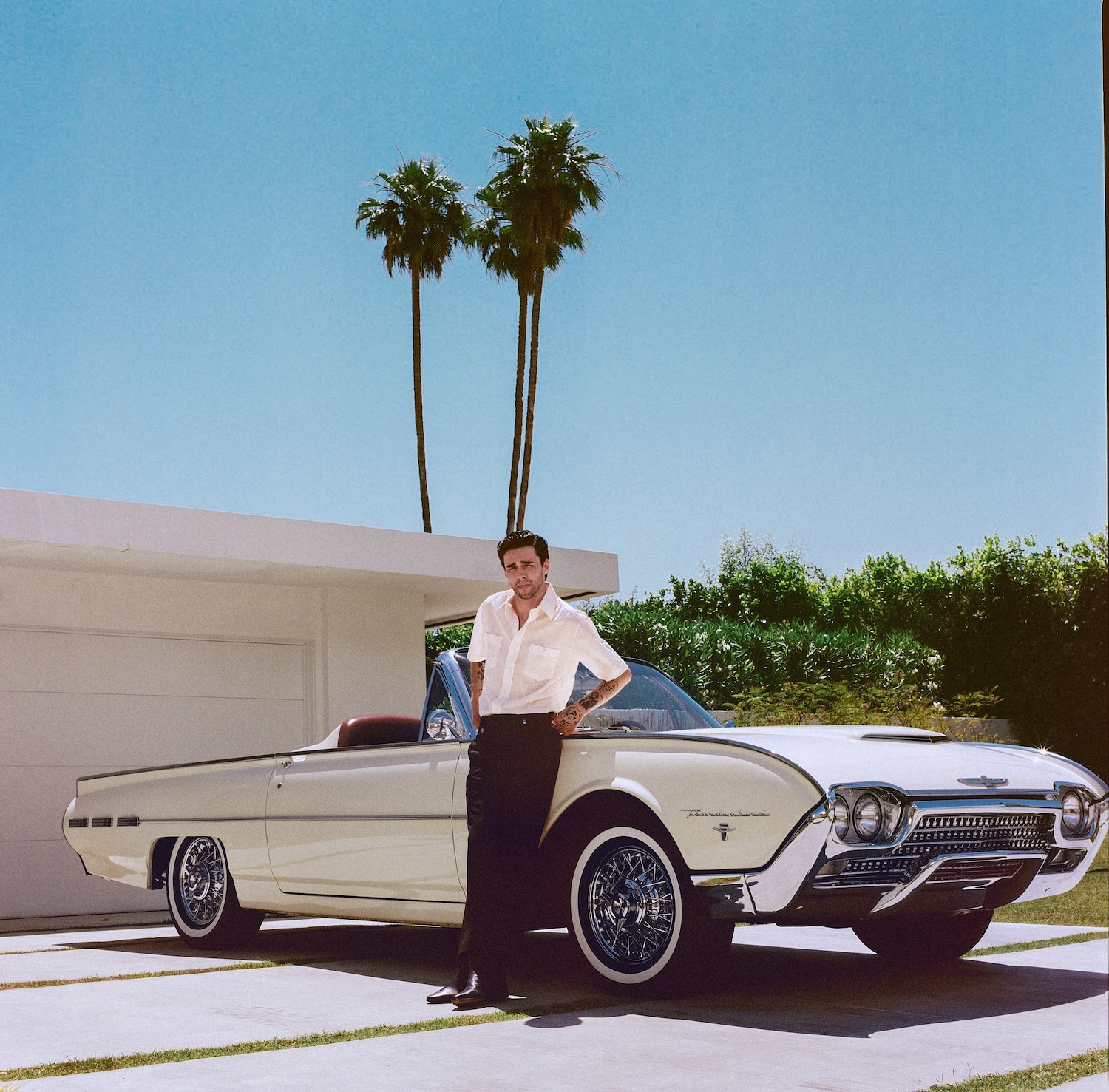
Sanchez, for his part, hopes his listeners come away from his album with a sense of hope.
“It’s a bit cliché, I feel… but is it? I don’t think so,” he reflects. “I think that a lot of songs now don’t really point a direction of where to go, or what to do, or how to feel. Not that I’m trying to tell anybody how to feel, but I think there’s not enough music that helps people to feel, and be caught in a feeling long enough to chase it, and then once they do chase it, to fall into it enough to have it turn into love.”
“And that’s what I hope for; I hope that people do get caught in a feeling long enough to chase it, and then when they do finally meet face-to-face with it, that they would stay with it long enough for that feeling to turn into love between each other.”
Stephen Sanchez’s beautiful, breathtaking songs and his vivid visual accompaniments are a refreshing light in a dark world. Fall in love with Angel Face, out now, and catch Stephen Sanchez performing on tour in a city near you (tickets here).
I just hope it brings people hope to escape something that is terrible, to run towards something that’s wonderful, to have the courage to actually say that they love somebody if it’s the truth.
— —
:: stream/purchase Angel Face here ::
:: connect with Stephen Sanchez here ::
Stream: “Be More” – Stephen Sanchez
A CONVERSATION WITH STEPHEN SANCHEZ

Atwood Magazine: Stephen, it’s great to meet you! There's so much to talk about but first and foremost, congratulations on Angel Face! What is it like to finally have released what feels, at least to me, like your “proper” debut album? I know it's not technically, but it feels like the debut.
Stephen Sanchez: Thank you! I mean, it kind of is on a technicality that it is the first full body of work that’s been released with as much marketing and passion that have been put into it. Those first two EPs were really emotionally taxing, just in the fact that the songs were about moments in my life that were real and that really mattered to me at the time. And so I think it’s easy to kind of feel a bit of a disconnect to a body of work when you’ve processed those emotions and you reflect back on that period and you’re like, “Yeah, the song and the sentiment is just different.” So it’s shifted my perspective towards those songs in a lot of ways and definitely has dampened my deep emotional feelings towards them, because I’m just not presently in that moment of like, “Oh, everything’s falling apart.”
But I think with this album that we have out, Angel Face, because it’s fictional and these are characters that I’ve written and this is a story, and it’s based in my visually and sonically favorite time – the ’50s and ’60s – I think there’s so much room to play and I just feel like so inspired by it still. Even though it’s out and I’ve been sitting with these songs for months, I’m still just like, “Oh, where can I keep the story going?!” I’ve never felt that with a body of work, so it feels really good, and beautiful, and I feel very content.
That's such a wonderful feeling to have! Tell me about the title, “Angel Face.” Where's that come from? What does that mean?
Stephen Sanchez: The record itself is set from the years 1958 through 1964, and it is highlighting the renowned career of famed crooner the Troubadour Sanchez who falls in love with Evangeline, who is the girlfriend of a mob boss named Hunter. And the name comes from the Troubadour and Evangeline’s secret romance that they spark up behind the vicious Hunter’s back. And it’s a nickname that the Troubadour gives to Evangeline. And Hunter is a club owner as well. And he owns a club called The Angel, which is where the Troubadour meets Evangeline because the Troubadour is playing shows at that club. And so he calls her angel face because she is beautiful; she’s got an angelic face. So Angel Face felt right.
I imagine some guy saying, “Here’s looking at you, angel face.”
Stephen Sanchez: That’s perfect, oh my God. Great Casablanca reference. I think it would’ve been better if he said angel face. [laughs]
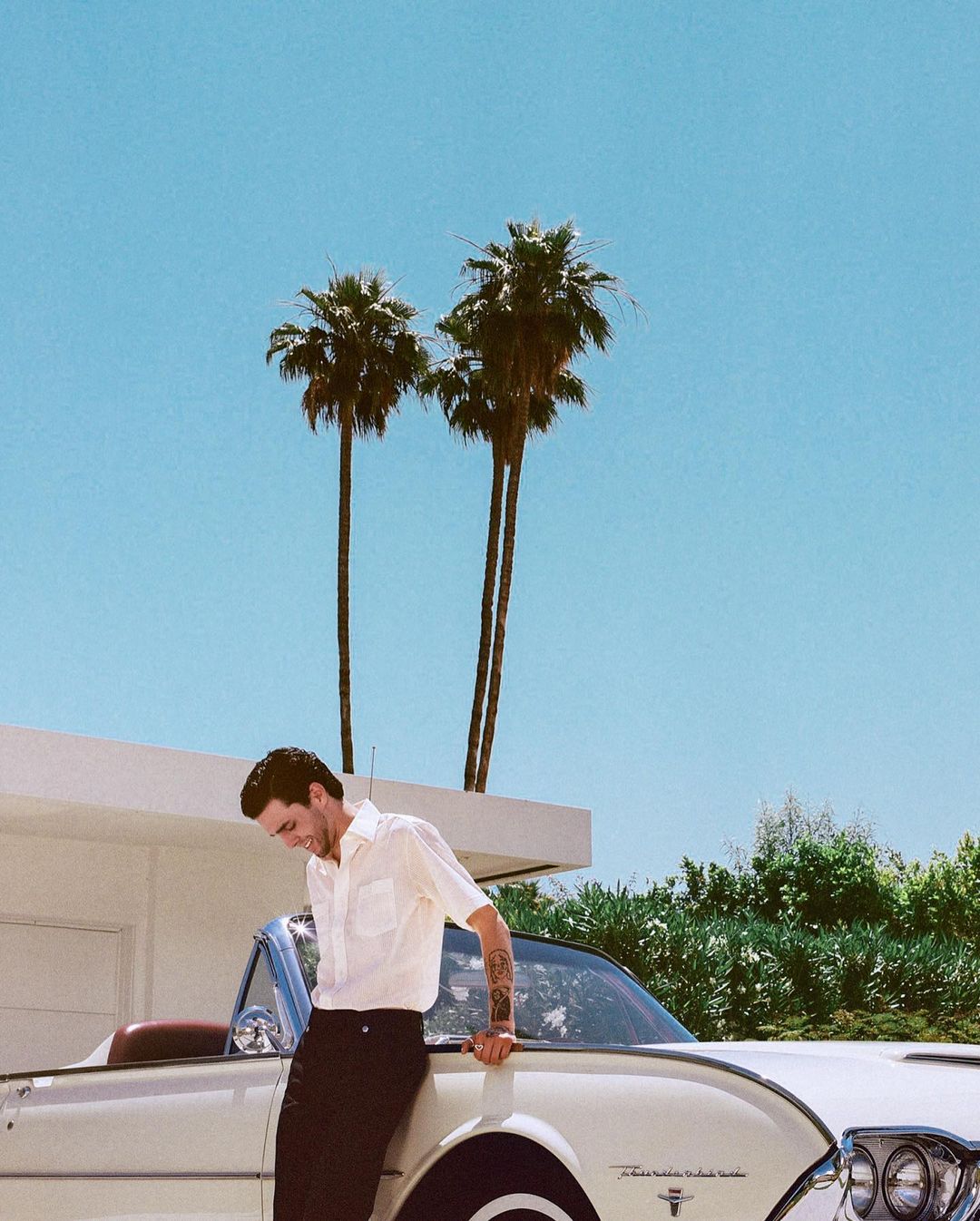
You’ve paired these songs with cinematic elements that make me feel as though I am watching a movie unfold. Even from your description, it sounds like you had a “cinematic” intent when bringing together the story of these songs. Has that idea been here from the start – have you been kind of scoring your own mini movie, or did you look back at these songs afterwards and kind of piece them together into that story?
Stephen Sanchez: Oh wow, that’s a great question. Honestly, the truth is, we didn’t have a story. We had all the makings of what could be a story. We didn’t have characters; we had all the makings of what could be characters. Like “Evangeline” was a name that came out of the blue when we wrote that song, and it’s what gave it that real ’60s flavor, like the cherry on top along with the Motown feel that that song gives, but to say that name with the grit like that, I mean, it just kind of set the stage and even personality of this character that was written later on. We started working on the record in December, and the first track we wrote for that was “Be More.”
And it was a deeply romantic sentiment that we didn’t even realize at the time, but like, was actually dialogue, and felt like dialogue. And as we were writing these songs, there was no goal to write a story, there was no acknowledgement of characters or how one of them might feel or anything like that. It was just, we wrote this record and wrote these songs as these songs were coming to us naturally and the time that they were coming to us, like as quickly as they were coming to us. And the dialogue and the characters and their stories became evident, like in the makings of this record. And I think like, even just being playful, like the Moon Crests, like in 1958 with Stephen Sanchez and all that, like, that came as like a bit of a joke almost just being playful because Ian Fitchuk and Konrad Snyder, like, they helped me work on this record and we all just, our mentality was to entirely create a world that felt like we were making a record back in 1958 and 1964 that we were recording it in that way. Like in one takes. And I think just out of that environment and atmosphere…
I think the story just kind of presented itself and then upon the record being finished, there were moments leading up to where I was like, oh, these are characters like, Evangeline is a character and the Troubadour Sanchez, that’s a character. And it just slowly started piecing itself together and presenting itself. It just feels really like we were all kind of the vessels for this story’s delivery, it just feels like it existed before us in a way that we couldn’t have made on our own. It just feels like that music and this time that we found ourselves in just kind of brought out this tragic tale.
Tell me about this time period and why it's so exciting to you, of the late 1950s and 1960s.
Stephen Sanchez: I think visually and sonically, it was some of the greatest music that was being created as well as visually being some of the most beautiful, the cars, the buildings, the architecture, the clothing, the style. Like all of it was just so, I mean, it was just so cool. That’s the only way to say it. It was just cool and I think that I’m attracted to that music because of the lyricism more than anything. I feel like it goes without saying that time period was one of the worst amongst a lot of worsts in history of America as racism and misogyny and things that were normalized back then that were fought against back then.
And I think that there’s a beauty in the fact that, that music is so inspiring to me, because for African American artists, which I’m deeply inspired by, like artists like The Platters and Smokey Robinson and James Brown and Marvin Gaye, those artists influenced massive pieces of this record, the style, the dictation, the vocals and lyricism, and all that stuff. So that music back then for African American artists, for people, the faces of the civil rights movement, that was a means of survival back then – writing those songs was survival. It wasn’t just something they did to get a paycheck. It was something that was bringing nations together, something that was getting people to believe in this new concept back in the day, that African Americans deserved rights.
And so for me, there were so many beautiful influences, with Sam Cook being another one of them that heavily influenced the heart behind this record as well. That songwriting is so attractive because it just feels like it’s more than just the music, it feels like that music is trying to either bring out people and remind them of the hope of love, or bring them into a place that’s giving insight on what’s happening into the world, and that these things are wrong. And so in this story, this is a toxic relationship, Evangeline and Hunter. This is what it should look like. This is what love should look like. There’s not a ton of that in the world, that’s telling people what it should actually look like, what love actually is. Those artists taught me what that was when I was growing up, so I just think it’s important.
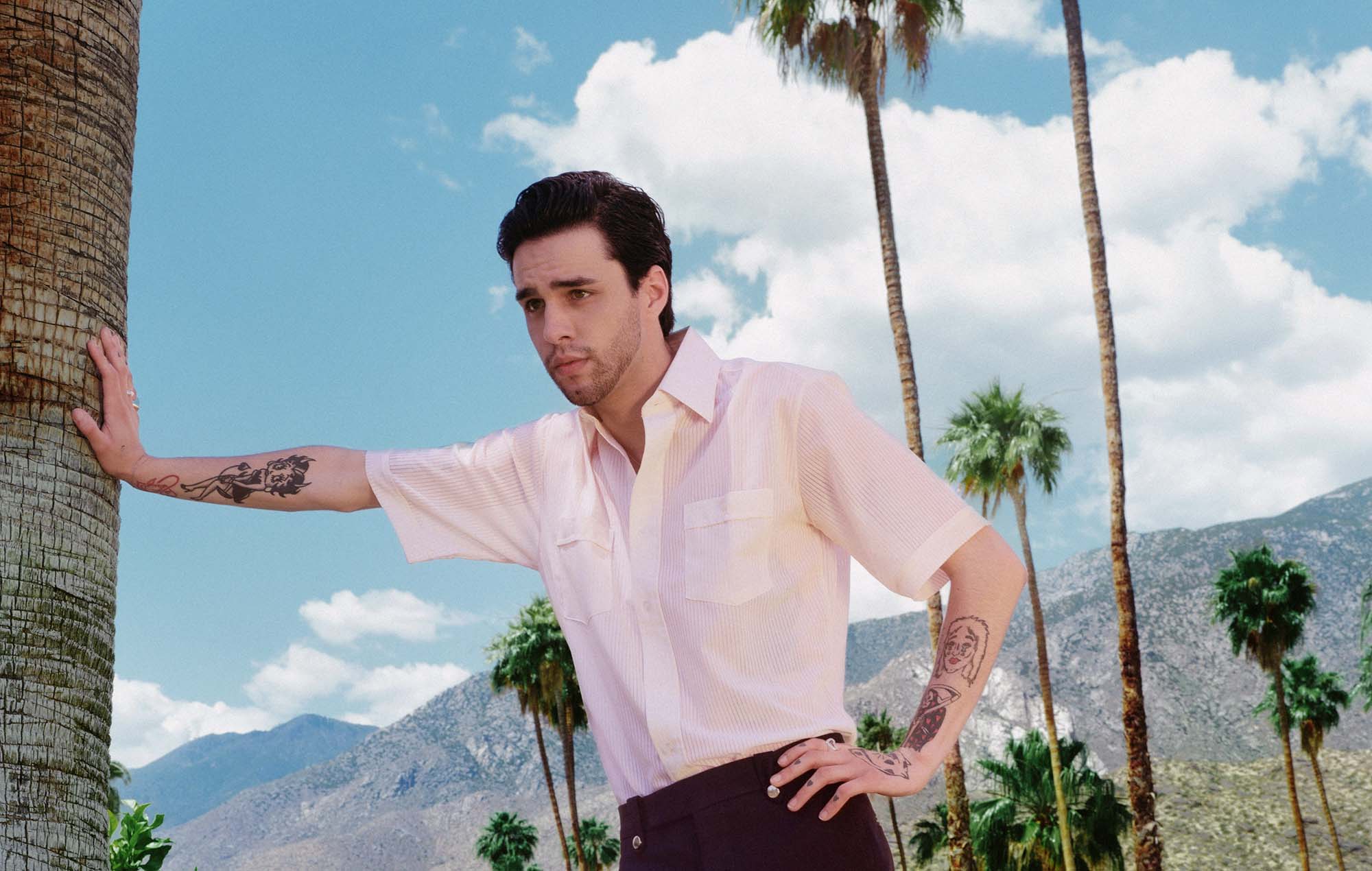
You segued into my next question quite nicely. What were some of your music inspirations growing up, and what does your journey look like, from a young kid in California, to the record deal, to recently moving to New York City?
Stephen Sanchez: I listened to a lot of early indie radio as well as some bands like Cage The Elephant, fun., Foster The People. Those were huge musical influences – and then Lord Huron later on down the road. I think for some of the stuff that we released prior, that was huge influence, but all of that segued into this deeper love, which was 1950s and ‘60s music. So anything from artists like Roy Orbison, the way he would sing, his crying voice, to Elvis and his moving, and how he wouldn’t just sing a song, he would almost make the song dance in his mouth a little bit. [laughs]
Like as he’s moving, he’s like, “Oh, huh, hey, they call me baby,” and he’s making the words jump along with him… That was super inspiring growing up. I think Frank Sinatra teaching me what love looks like, The Platters with their harmonies and the big band thing… There was so much of that growing up. I think for me, I was just stuck in the singer songwriter thing for a really long time. And not that I have dwelled away from it, but I just mean like the very Americana plucking on an acoustic guitar vibe. That’s all I did, and I did that all through high school, and I would set up in the cafeteria and sing for my peers. I’d sing at church on Sunday, and there was all these little things here and there – I’d sing for my family – and then somehow, I have no idea how, it feels like a miracle every time I think about it.
My voice got in front of the right folks, and they wanted to record my voice and this song that I wrote, “Lady By The Sea,” which is the first thing I ever put out, and that launched my career! It was the stepping stone for this moment right now, with the release of this record. Even the writing of “Until I Found You,” I think if that song was released any earlier or any later, it just wouldn’t have done what it did at its moment in time.
Let's talk about “Until I Found You” for a second. You've crested 1.5 billion streams on Spotify alone.
Stephen Sanchez: How absurd is that?
This song has been on every single EP and album that's come out to date. Do you think it’s finally found its final home on Angel Face?
Stephen Sanchez: [laughs] Man, I’ll be truthful. I didn’t agree with putting “Until I Found You” on Easy on My Eyes. I didn’t love the idea of it being on there… It puts a lot into perspective, ’cause now this record’s out, I’m like, “Yeah, this fits here. This makes sense here.” It goes without saying that those first two EPs were kind of visionless, in a way. The first EP, all the songs were written three years before I ever got signed. Easy On My Eyes, I was writing those songs along the way, and we just picked our favorites. There was no story, there was no nothing.
I think why it feels like it works so well, and why this record is working so well, is that it actually has a concept. It has a heartbeat to it. It’s not just something that was thrown together – not to knock my own musical releases, but this was not just thrown together. This was something that was thought about – that I have lived in for years before it was even made! And now it’s out!
Yeah, it’s kind of found its home. Even the story of “Until I Found You” is how Stephen Sanchez and the Moon Crests back in 1958 got their start, putting a little trickle of reality in there, but making it fictional. It definitely feels better having it on this album, for sure.
One thing that became clear very quickly to me was that “Until I Found You” was not the only hit that you were going to write. That being said, what's your relationship with that song? What does it mean to you now?
Stephen Sanchez: The opportunities that song has allowed have been unbelievable. That song was the ground zero of even the creation of this record; without that song we would not have had “Evangeline,” because there’d be no desire to write “Evangeline.” There’d be no drive to do that. And then to release a whole record like that, it just wouldn’t have existed. This record wouldn’t exist without that first initial jump.
Do you think making that song gave you the urge to keep on exploring that time period in music, where your sound comes from?
Stephen Sanchez: Totally. I released that song because I loved it and I loved the sound I made. Not because I was like, oh, I wanna write… The goal wasn’t to write a 1950s love song. It just happened to be that way. And it’s the same with this album. All these songs just happened to be that way. And this debut record happens to be that way. It’s kind of a funny thing. And so honestly from Glastonbury to weddings, to seeing people soundtracking their lives with it, and now the fact that that song opened the door to release a full record, that it can sit in and live in amongst other songs that feel just as great as that one. It’s like, it’s not better, Jesus, holy shit. Yeah. It feels extremely, I just feel satisfied. It just feels really, really great. It feels like I’ve closed the book on it a little bit in a way.
It feels like “Until I Found You” is connected to Angel Face as well, in a way that’s like, all right, you like “Until I Found You”? You’re gonna love this album. Perfect, here you go. Here’s a whole body of work now, so you don’t just have to sit and listen to the one song over and over and over again.
That's literally what “Evangeline” was like for me! I like listening to your older material as well, but I love that sound that you’ve tapped into. And when I first heard “Evangeline,” I was like, “holy shit, he's gonna give us more of the sound!”
That being said, when I listened to this record, when I heard the song “High,” that is what told me you can do like modern rock too. That song both does and doesn't fit in this world, in a way. It’s much more modern, making me wonder where you might go next.
Stephen Sanchez: That song, it definitely breaks you from the spell a little bit. It’s intentional at this point now, ’cause it’s the moment in the record where the Troubadour is kind of giving a big middle finger to Hunter and saying, I’m gonna steal your girl, actually. I’m not asking permission. It’s this moment of the tussle between the two. And I think that song was a happy accident, as most of them are.
I was in Seattle with the boys in the band, and we were finishing up our last tour, and I was horribly sick. And we were like, I was finishing the tour on a, standing on a one leg. And I walked in to do a little sound check with them, and then we just started messing around. And that song, exactly the way that it’s recorded, we wrote it all together on stage during soundcheck, I wrote all the lyrics, the boys played all the instrument parts. Then I finished writing it backstage with my guitarists. And then we walked onstage and we played it exactly how we played it on the record, live in Seattle for the very first time, [laughs] which was ridiculous! It’s the most insane story.
It just felt like we’re bringing people into this world, and the first half feels very Roy Orbison, ‘60s, Troubadour vibe, and then you get to the middle, which is Motown, “Doesn’t Do Me Any Good,” and then you get the rockabilly… I just think we wanted a moment where I was like, all right, this is gonna be a bit of a shocker of a song – whoa! What is this?! And then it throws you right back into “Doesn’t Do Me Any Good,” so you’re right back under the spell all over again.
It just felt right! I think as far as new songs go, I’ve been playing with the idea of making an EP with that sound and having it kind of a little “DLC,” if you will, of this album, and making it like, Evangeline goes crazy and hunts down Hunter to kill him for killing her lover, that kind of thing. But who knows? I’m just enjoying writing stories, so maybe it’ll be fun with new sounds all over again!
That's awesome, Stephen! It's a fun song. It's very different, and I enjoy it being different like that. Another one that really got to me was “No One Knows,” the one and only artist collab on the record with Laufey. What was making that song for you? It seems like a perfect musical match.
Stephen Sanchez: Yeah, it feels like a perfect match, almost. She is amazing. The process of writing that song was super beautiful. It’s such a deep, deeply sentimental memory for me. Lord Huron is one of my favorite bands of all time, if not the only band that I have any bit of reverence for. Their artistry, craft, and conceptual record making is absurd, and that’s all because of Ben Schneider, who’s the base of that. I’ve wanted to work with him since I was in the seventh grade, and I finally got to when we wrote that song together!
It was the first day that we were together and we wrote that song, and we just fell in love with it. He produced it and it felt like a duet. It was at the point of the record too, where I had shared with him that this is such a deeply romantic story, the Troubadour and Evangeline, they ride off into the sunset. And he is like, “That’s not realistic.” He’s like, “There’s trouble and heartache and devastating blows in relationships.” So that song was this moment of realization where it was like, “Oh, that is important – as much as this sweet, soft, gentle love is, the love that’s hard and difficult is important as well.” And so that song felt right.
Then when it came down to actually recording it, a duet felt correct ’cause it’s a conversational song. It’s not just something that we’re just singing for you to just happy to sing along to, it’s something you pay attention to and you’re like, wow. These are two voices realizing that they both are awful to each other sometimes, but they love each other and they’re sticking together – and that’s important! I think there’s not a lot of songwriting nowadays that’s like, this person’s stuck, but I’m so in love with them and I’m choosing to be with them. It’s only catered to an audience of people who only wanna hate their partner that they’ve left. So this felt right!
I love the idea of 40-year-old Ben Schneider killing your 20-year-old romantic, wide-eyed wonder. That to me is so precious.
Stephen Sanchez: [laughs] Thank you! We can thank Ben for the results of the album. We wrote “Death of the Troubadour” together as well, and that song wouldn’t have existed without him. Literally, I wasn’t supposed to die, and then we accidentally wrote that song and I was like, “Oh, okay. I guess I die. How do I die now? Where do I die?” And then we wrote the ending, and it’s just so funny, those things, even “Caught in a Blue” is another one we wrote, and it’s still sharing that sad, like “if I were to die, I’d still love you,” or “if you were to go, I’d still love you” kind of thing.
Is there beauty in romance, even when you don't end up happily ever after? I think that's what it comes down to. What is the story, with those last three songs? What is happening to our fearless Troubadour?
Stephen Sanchez: So, “Caught in a Blue” is a conversation that he’s having backstage with Evangeline. It’s like, I’d be caught in the blue over you. I mean, that’s it. Like, if I were to lose you, I never wanna leave you. I just don’t want to see a day without you kind of thing. It’s this moment of like, okay, we’re deciding to run off together. Let’s decide to choose each other. And they’ve both now collectively been like, “Okay, we’re gonna do this. We’re gonna leave LA forever. We’re gonna play this show. We’re gonna run off with the money we make for it, and leave this town forever.” The Troubadour is gonna leave his famous life behind, Evangeline is leaving this mobster world, that she found herself caught up in, and then we get to this moment where it’s like, he goes to play the show and he realizes, oh, Hunter knows about this whole thing and he’s not gonna let us escape, and he is not gonna let me escape, if anything.
It’s this moment with such humility in it. He’s like, I’m gonna die, but my heart for you will stay. There’s this instrumental, big scene of just like, dananananaa nana… and there’s fighting and all that, we did a visualizer for that. And then we get into “Send My Heart With a Kiss”! The Troubadour dies during that song, the “Death of the Troubadour,” and “Send My Heart With a Kiss” is the love letter that the Troubadour wrote to Evangeline before he went on stage. It’s like a final, if all goes south, this is what I wanna say.
The whole sentiment of that song is like, “I may not live for a long time. Still, I feel that my soul cries for your love.” This record is all about love’s humanity, and within love’s humanity is the fact that we all have to go at some point. Whether it be that circumstance takes the ones you love or the end of your life does, you have to come to this moment of acceptance for that.
I think this song is just that. It’s this moment of, “I’m gonna love you forever though.” And it’s reminding that all the trouble no one knows – being caught in a blue, all the sadness, all of this, all the struggle and trouble you go through, all the longing for someone, wanting someone to be more than just a friend – that last song captures the whole sentiment of just like, it doesn’t matter at the end, as long as you know that you love them and you want them to know that, then that’s it.
You talked about your musical influences. When you think about love and prime examples of what love really looks like, what are some examples that you think and reference? From books to movies to your own lived experience, what are your foundations?
Stephen Sanchez: I mean, the human experience is definitely a big influence on everything, all the time. [laughs] The world is kind of the doer and we’re the observers of what it’s doing. I wrote the record when there was a lack thereof in my life. And I’m very in love now. It’s beautiful, and I’m excited about that. I think it’s a different sentiment when you are in love and then when you don’t have it at all, different desires come out in that.
But I think movies that have those same sentiments… There’s this movie called Love, Rosie. It’s a great one, and they are constantly at the hands of missing each other. Just the timing never lines up and they just keep missing, and then finally they do. There’s that satisfaction in the end. In the movie Some Like It Hot, Marilyn Monroe grieves this guy that she’s met and she’s like, “I’ll never love again, said adieu to love, don’t ever call again,” and he hears her singing this song and he rushes to her aid to be like, “No, don’t give up on love. I do love you!”
There’s always this satisfaction in that, but I think in songs, there’s one in particular that I really referenced for this record. It was Marty Robbins’ song, “El Paso,” which sings of the story of these two cowboys fighting over Felina in Rosa’s Cantina. One of the cowboys sees him talking to her, and he kills him for it. He has to flee the area and he hides away for years, and then he returns to the town because he can’t help but come back to his love, and the lawmen of that town find him and gun him down, and he dies in the arms of Felina. It’s this dramatic scene… Like, maybe you do get the satisfaction. He got to kiss her one last time, but he dies.
He doesn’t get to have the whole thing, and I think there’s the beauty of that, in the reality of love, where it’s like, my God, we get to be with someone, God willing, for 60 years, right? But anything has the power in life to take that person away physically. But emotionally they remain, they linger on, thank God for emotions for that. Right? Physically you won’t be able to see them. You won’t be able to hear them, but God, being able to know what they feel like, that your mind has been so wrapped up in a person that you remember them.
I think movies that share the sentiment of like, you don’t get them all the way, I love that. I think that’s why I love the story that I’ve written so much is because Evangeline gets bits and pieces of the Troubadour, but they never get to ride off into the sunset. They never get to live their life together in peace. “No One Knows,” within the story, is a sarcasm that they’re sharing back and forth to each other. Because they haven’t gone through enough to know what it would be like to hate each other and love each other enough to hate each other. But they’re playing with this idea of like, “Haha, no one knows the trouble, honey, that we’ve been through.” They’re playfully saying things that might come up in their relationship later down the line. That’s the sentiment of that song, and I just love that stuff so much.
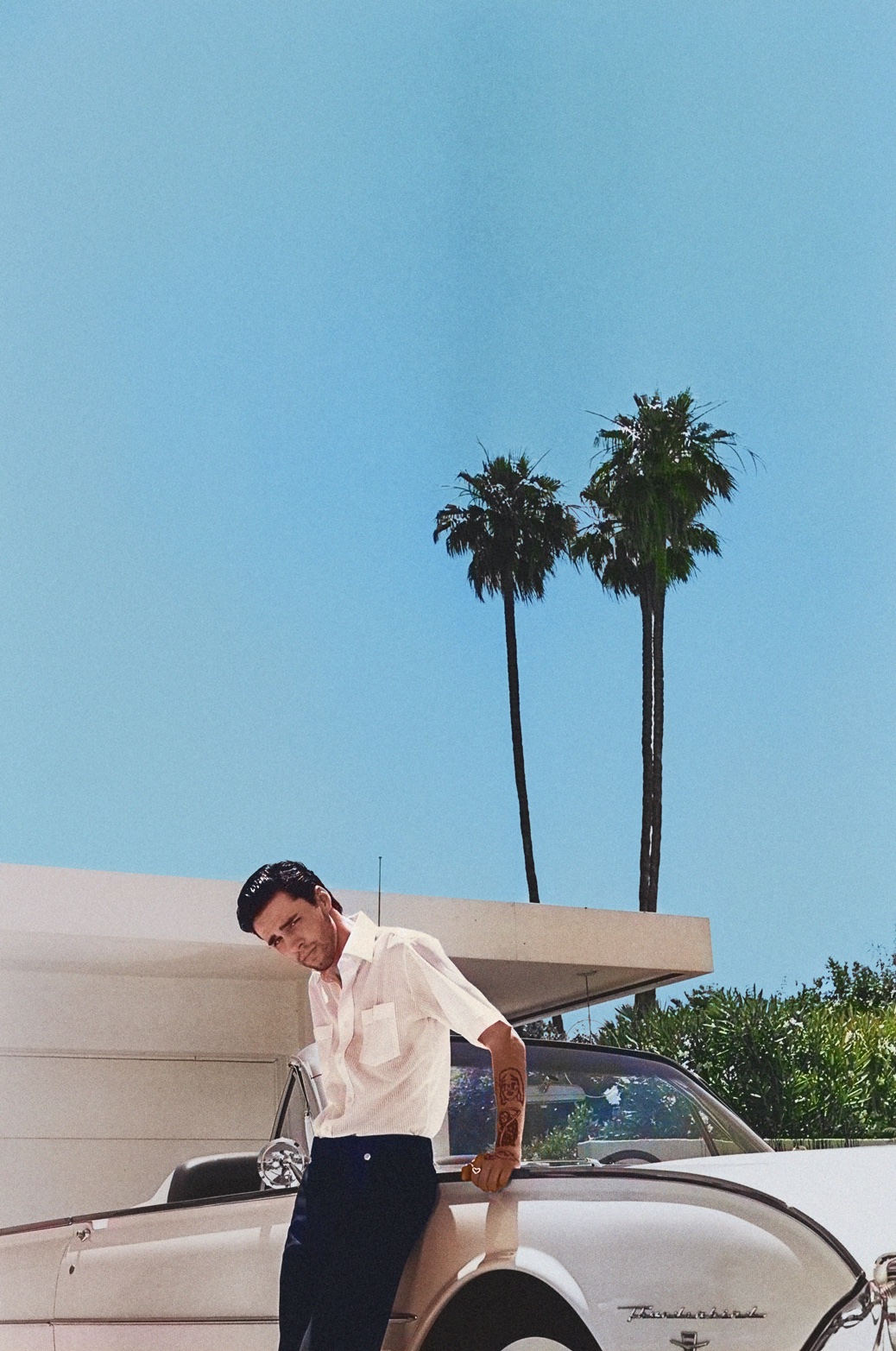
Now that you've made a record and found the joy of putting a story behind it, do you think you might want to try it the other way around, where the story comes first and you write the music to the story, rather than writing and finding a story after the fact?
Stephen Sanchez: 1000%. Yeah, I think with this little tiny EP, I would like to release this literally an extended play of this record. I already have a title for it and everything, and I know what I wanna do with these characters. It’s more about the music, even exploring a bit of new sound, because I want Angel Face to stand on its own and be special for what it is. I think if there’s an extension to that, I think it needs to be something that has a little bit more of a different feel with elements of that flavor, because I will always love that sound and I’ll always implement flavorings of that into my music from here on out… But almost like Arctic Monkeys’ “Piledriver Waltz” vibe, or like the Suck It and See album vibe or something like that, where there’s trinkles of the ’60s. Yeah, I’m not sure just yet, but I’m really looking forward to exploring that. I think it’ll definitely come written beforehand, which would be exciting to try.
Well you don't really have to wait too long. Zach Bryan waited about three weeks between his latest album and his Boys of Faith EP. So… however soon you wanna bring it, feel free!
Stephen Sanchez: Yeah. It’s a bummer we’re going on tour. I’d go right back into the studio working on stuff.
How do you feel about that, bringing this album out into the world? What's the plan for creating recreating that cinematic atmosphere in a live environment?
Stephen Sanchez: Well, we’re all dead. We’re ghosts on this tour, the Troubadours and the ghosts, the Moon Crests are ghosts – like we’re haunting these venues, telling our tale of woe in this never-ending cycle of reliving that story which is Angel Face. It’s gonna be very theatrical – I’ve written lines to say before songs, and the way that I’m saying it is in the Troubadour fashion like, ladies and gentlemen, the song you’re about to hear is…
Stuff like that – making it intentionally playful, because we want as much of this record to feel like a spell that you get caught in, especially when you’re at our show. We don’t want it to feel like anybody else’s show. We want to feel like when you come and see our show, you’re paying not to see Stephen Sanchez, you’re paying to see the Troubadour Sanchez and that vibe, and you’re paying to hear about Evangeline and you’re hearing me insult Hunter when he’s not even there in the crowd, but you think he is. I just want to immerse people in this world, as if they’re watching a movie, and have them care about the lore and the characters. And yeah, so it’s really important to me for sure.
Did you enjoy Lord Huron's last album, Long Lost? That reminds me of the world Ben created with Whispering Pines, and the old-timey radio DJs, and all that. I think you’re creating the perfect world to complement the music.
Stephen Sanchez: Oh, thank you very much. I genuinely enjoyed that album so much. It was, it’s funny, when I got signed, it’s crazy to think it was this long ago now, but when I got signed to Republic, what got me was that my A&R at the time, Ben Adelson, sent me some of the tracks from that new record. And so I got to listen “Drops in the Lake” and “At Sea” and “Long Lost” and those songs, and “Mine Forever.” And I was like, “Oh, God it’s so good.” And it’s amazing, because he, I think he’s still, Ben Schneider, he’s still kind of lost in that long-lost Spaghetti Western world. And so he played a huge influence in that being a sound that shows up in this record, which is really exciting.
And I love it. It just gives, it’s such an homage to every genre. It feels like, like you got the crooner pop vibe, and then you got the ’50s Spaghetti Western vibe, which is very cool. So I like that there’s a lot of ebb and flow on the record, for sure.
What are your favorite songs off of this record? Whether they're the biggest hits or the deeper cuts, you know, what are you kind of the most proud of putting out into this world?
Stephen Sanchez: I was really proud of “No One Knows,” for sure. Having written it with one of my musical heroes, that was a huge thing for me. “Be More” really set the standard for this record and the level at which we wanted to write these songs. A lot of the songs on this record were vocally very, very huge for me. So I just love that song so much, I love the lyricism of that song. I love that it was the first one that we wrote, ’cause it feels like we kind of got out of the way there. It’s like, “Okay, we wrote the really intense, huge one. We can rest now.” I love “Caught in a Blue” so much. “Something About Her” means a lot to me personally, because I just have such a deep connection to that song. It is the first love song I’ve ever written, genuinely. It just feels like every time that I’ve written a love song prior, I didn’t know what it was. I was trying to understand it through my writing, but it feels like this song, I know what it is.
You wrote that song once you were in a relationship, is that what you're saying?
Stephen Sanchez: Well, I am in one, and I do know what that is supposed to be like, and that song is that for me. And so I just feel like I understand the healthiness of what that looks like, the beauty of what that looks like. That song is an audible expression of that understanding, and it’s extremely special to me for that reason, and it’s beautiful; I love it.
I'm so happy for you! Do any lyrics that you wrote for this record continue to resonate with you to this day?
Stephen Sanchez: Oh, wow. I love this. I particularly love this lyric, it’s like this self-reflection in “Caught in a Blue.”: “Is this the cost for love that’s true? Forever lost, looking for you.” It’s like being in this never-ending state of looking for the right thing, in people who will never be that person. It’s like you’re only found with them; I just love that sentiment of just realizing, “The reality is, if this were to end, I couldn’t do it. I just can’t do that. We have to stay together, because I will be forever lost searching the whole Earth looking for something familiar and I’ll be forever unsatisfied ’cause it’s not you.”
The Romeo and Juliet of it all.
Stephen Sanchez: Yeah, exactly. I love the visual lyrics of “Be More”: “It must be more than dancing in raindrops, falling to touch you. Oh, just to touch you.” You become reflections in the raindrops that you’re dancing under, and they fall down and touch her skin, and you’re almost jealous of the raindrops touching her skin, because you want to be the only one to be so close to her in that way… I love that! I think those two songs stick out for me a lot.
I also love the lyric in “No One Knows,”: “You’re still the picture in my locket, lucky penny in my pocket. But still, I hate you when you’re talking to me so cruel.” It’s so on the nose, there’s no trying to figure out any lyricism; I feel like it’s all very straightforward, which I love.
Wrapping up our conversation, what do you hope listeners take away from Angel Face, and what have you taken away from creating it and putting it out?
Stephen Sanchez: Man, it’s a universal feeling, I’m sure, for a lot of artists, but hope would be a big thing. It’s a bit cliché, I feel… but is it? I don’t think so. I think that a lot of songs now don’t really point a direction of where to go, or what to do, or how to feel. Not that I’m trying to tell anybody how to feel, but I think there’s not enough music that helps people to feel, and be caught in a feeling long enough to chase it, and then once they do chase it, to fall into it enough to have it turn into love. And that’s what I hope for; I hope that people do get caught in a feeling long enough to chase it, and then when they do finally meet face-to-face with it, that they would stay with it long enough for that feeling to turn into love between each other. And maybe a realization that things can work out, and that relationships do have trouble, and that there are realities in relationships that matter or don’t matter…
I just hope it brings people hope to escape something that is terrible, to run towards something that’s wonderful, to have the courage to actually say that they love somebody if it’s the truth. That’s all I want. I don’t really need it to be famous or the greatest album on Earth, ’cause I think it is, personally. [laughs] I just hope it can be whatever people need it to be at any given time. What’s the point of making music if it can’t be for other people, you know?
Absolutely, I appreciate that sentiment! In the interest of paying it forward, who are you listening to these days that you'd recommend to our readers?
Stephen Sanchez: Ooh. There’s a song called “Sold My Soul” by Cut Worms. It’s off Cut Worms’ record Nobody Lives Here Anymore. Brilliant song; I haven’t gotten to deep dive into that record, but I imagine it’s a brilliant record as well. Give them a listen. I’m a bit biased, but I’ve been loving Laufey’s new record, Bewitched – it’s been on a spin cycle. I just freaking love it, it’s awesome. I would recommend those two, because I really have been enjoying those records a lot.
— —
:: stream/purchase Angel Face here ::
:: connect with Stephen Sanchez here ::
‘Angel Face: The Live Visual Album’ – Stephen Sanchez
— — — —

Connect to Stephen Sanchez on
Facebook, Twitter, TikTok, Instagram
Discover new music on Atwood Magazine
© Caity Krone
:: Stream Stephen Sanchez ::

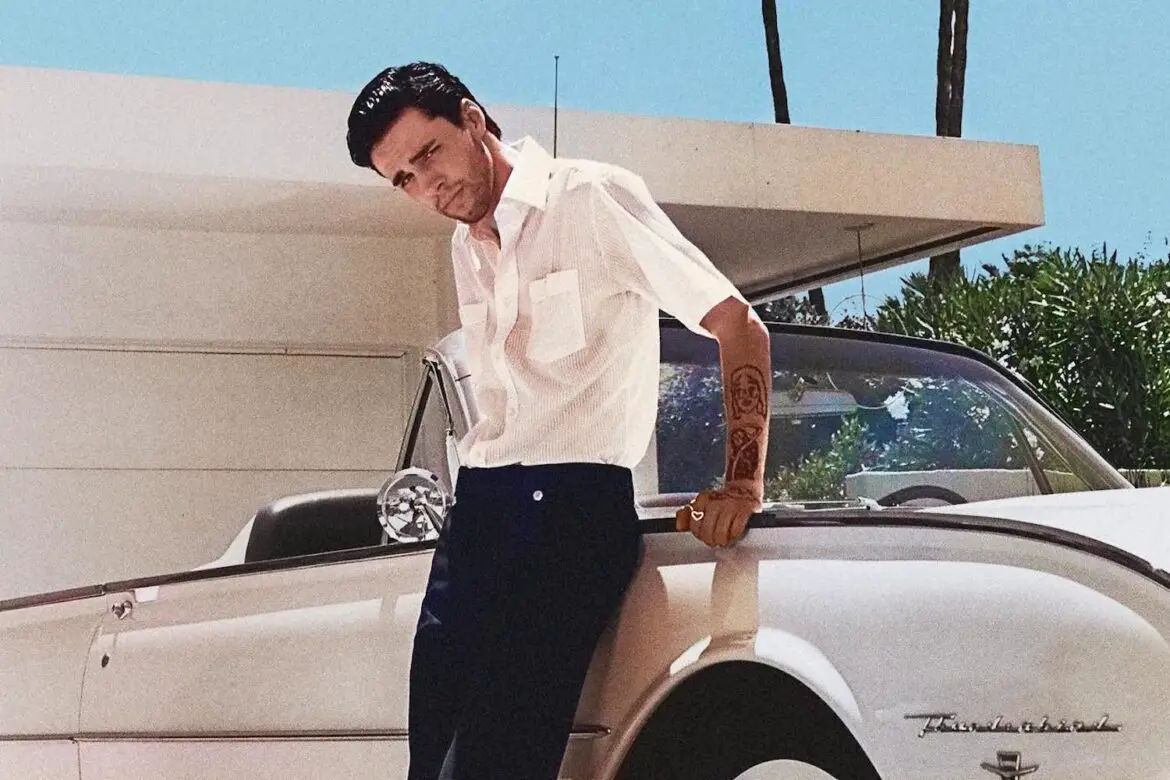
 ©
© 

